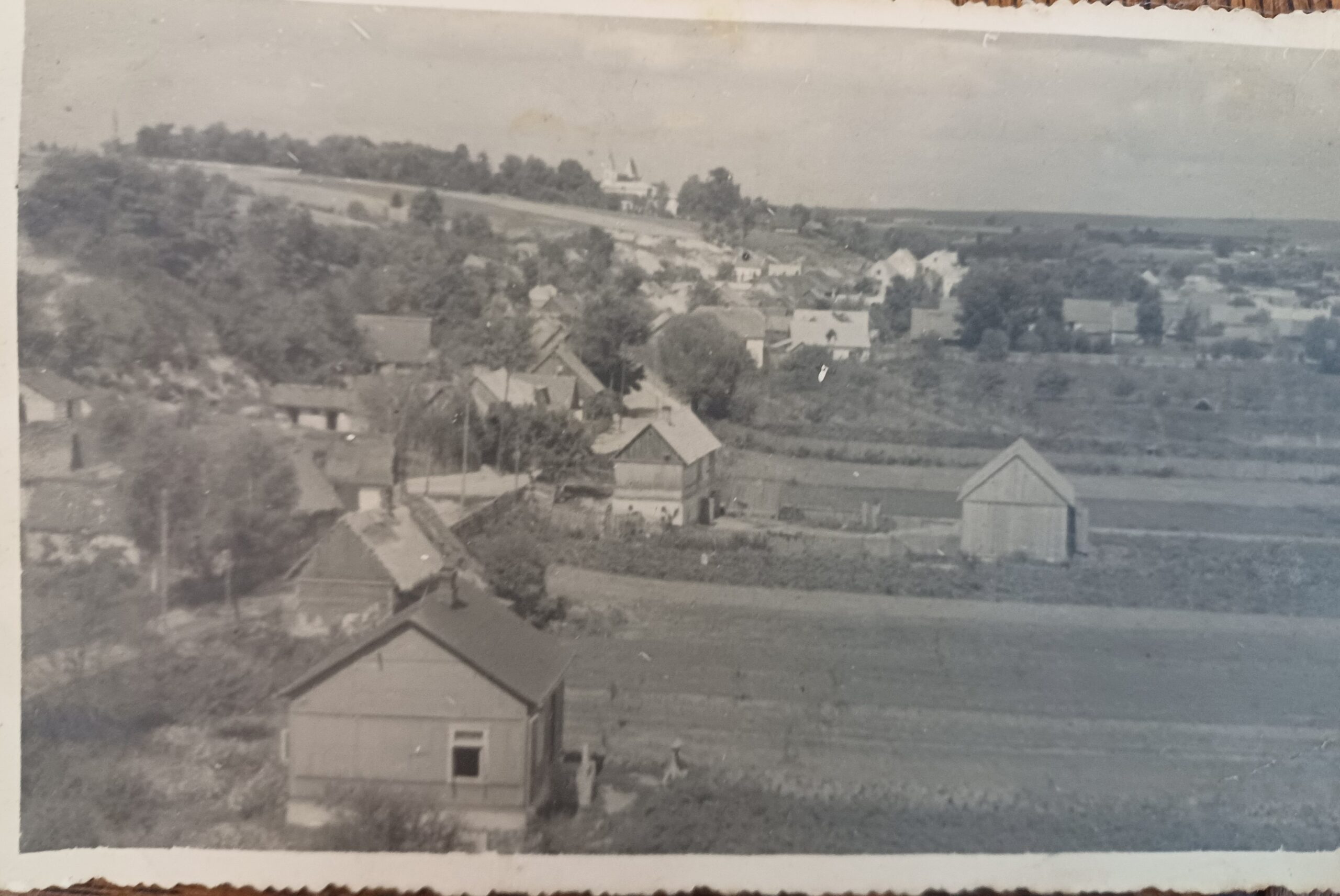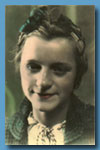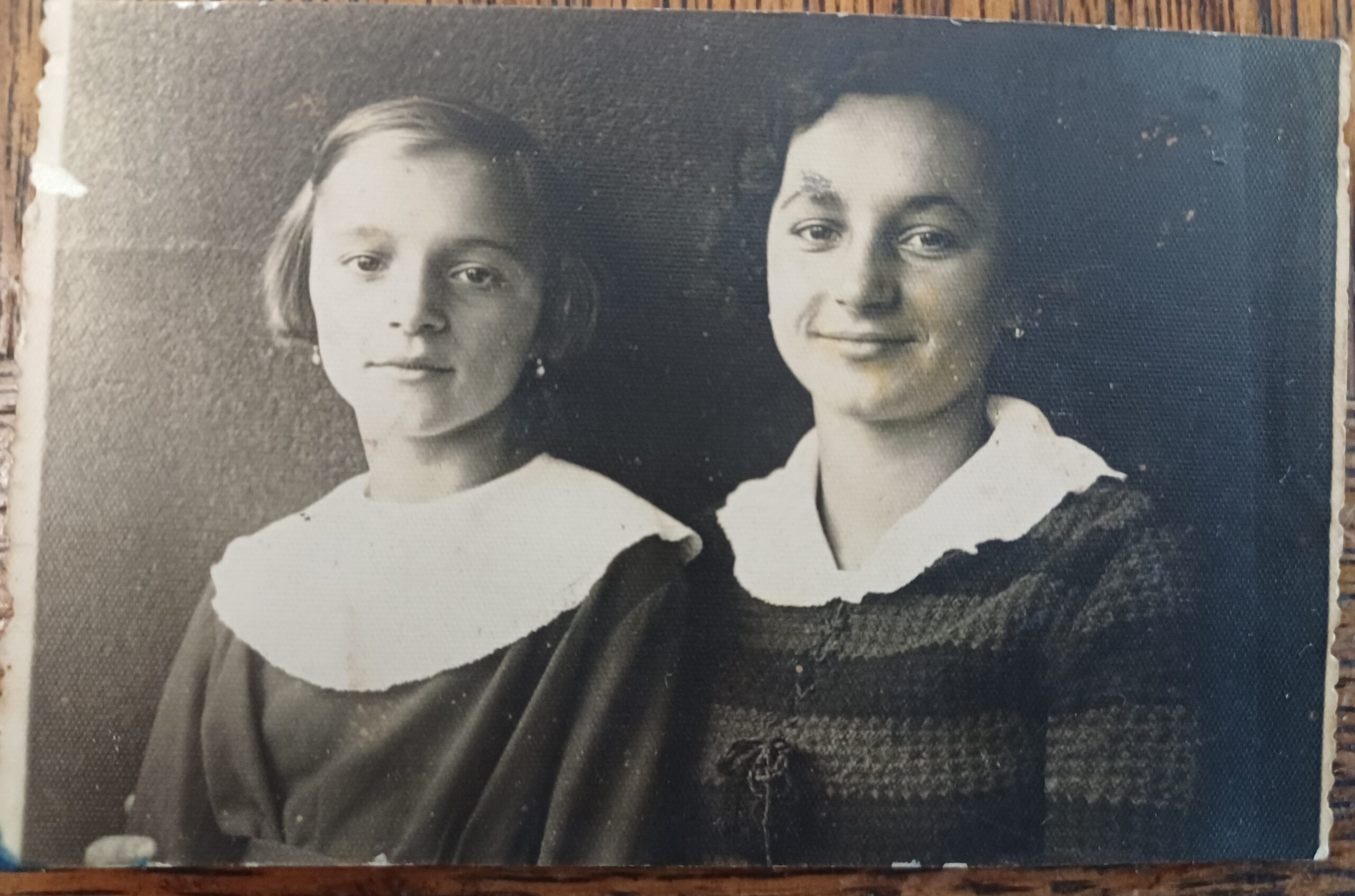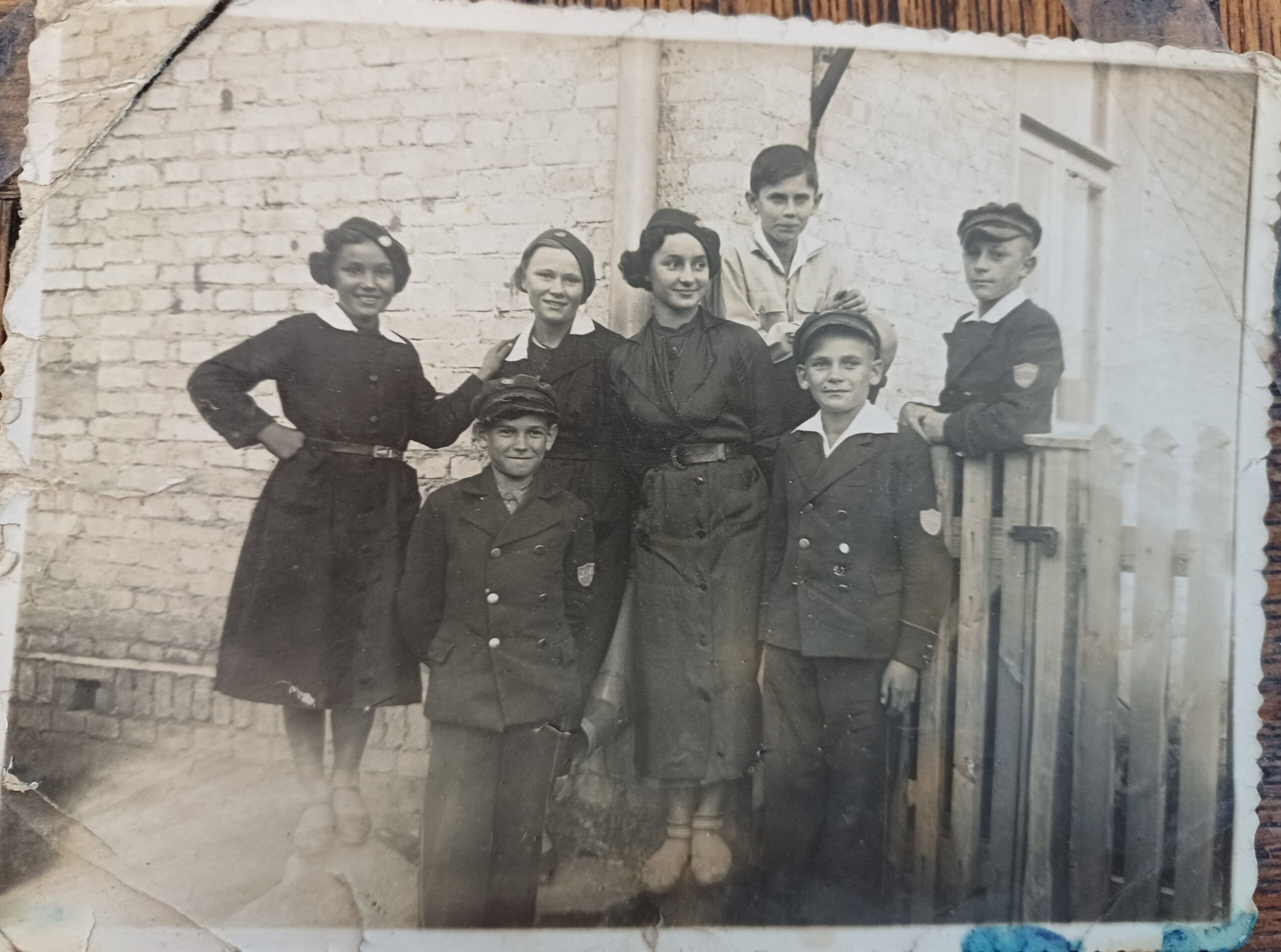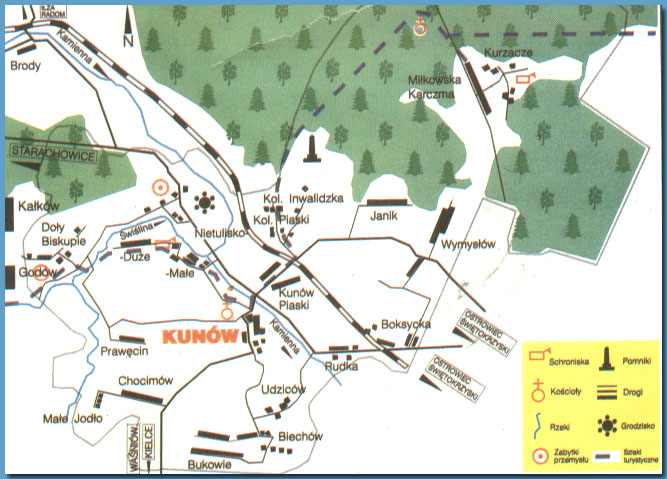Little Homeland of our Family – Kunów, Świętokrzyskie Mountains, Poland
Little Homeland – Kunów, Świętokrzyskie Mountains
Occupation Memories 1939-1945
There is such a place almost in the center of Poland, almost in the center of Europe, at the foot of the Świętokrzyskie Mountains, our Little Homeland, it is called KUNÓW –
– short historical outline – Kunów is one of the oldest towns on the Kamienna River – a tributary of the Vistula.
In the 13th century it was an important center of the property of the Kraków bishopric. Kunów was granted city rights in the 15th century (a privilege of Kazimierz Jagiellończyk from 1467). In the following years, Kunów underwent war damage (eg the Tatars in 1502), the liquidation of the settlement and the re-location of the city under Magdeburg Law in 1535.
The main economic specialization of Kunów of those centuries was mining – masonry = rich, local sandstone deposits (in 1637 a stonemason’s guild was organized in Kunów), and the processing of local iron ores (the first Kuźnice was established in 1597).
To this day, our town has retained the sixteenth-century spatial layout. The most valuable monument to visit – the Church of St. Władysław with a 14th-century pedigree, expanded in the years 1625-1642.
_______________________________________________
Our mother and grandmother, Danuta Zimoń (photo – middle of the war – 1943 – she was 18 at the time) p.v. Słotwińska, s.v. Myszkowska, for many years the director of the Vocational School Complex in Kunów, kept a family chronicle and collected information about Kunów – our Little Homeland.
She has always taught us to respect memory, she has left us her motto for her memories written for many years:
“Sometimes memory overwhelmingly causes something to the heart
What strength would it take to make it close
What a stone and a tree and the sky all around
to make them become a habitat for these experiences? “
D. Zimoń
We allow ourselves to be sent to the Gallery of National Memories and Remembrances – GA.PA – one of the memories of my mother – from the years of the occupation in Kunów in 1939-1945 – with great hope that visitors to the GA.PA National Gallery will mention our Little Polish Homeland – KUNOWIE , its turbulent history and the people who lived here for many generations fought for its freedom.
Occupation Memories 1939-1945
September 1, 1939 I will remember for a lifetime. Earlier predictions and sentiments deepened the atmosphere of expectations and uncertainty. I remember early August morning when a huge red glowing cross appeared on the eastern side of the sky. Could this be a special sign of what was to happen next? Father Wiktor was not superstitious, and yet sadly said “there will be a war”.
On September 3 the school bell did not ring and I did not find myself on the bench of the second grade of the Commercial Junior High School in Ostrowiec Świętokrzyski. Bad news, like an avalanche, poured onto my slightly confused head. Sorrow and uncertainty were pervasive. The radio said, “Attention, Attention! Coma three is coming, ”followed by the roar of aircraft engines and the increasingly dull detonation of bombs. On September 7, the Germans occupy Kunów.
With regret I remember the remnants of the crashed units of the Polish army in the battle of Iłża. Injured, wounded and hungry, they knocked on the door asking for help. Those who managed to get out of the encirclement said, we have lost the battle, but not the war. They left behind weapons, gas masks and all war accessories that could become their captivity. They asked for civilian clothes, and they left hope saying – “hide everything that will serve the further fight against the enemy.”
These were holy words, because this very moment triggered an avalanche of help for the survivors and an unprecedented willingness to help.
Father Wiktor left himself only one suit and one shoes, giving the rest to the survivors. Nobody asked for names and surnames then, only help mattered. very soldier saved from the battle was worth its weight in gold. Those who failed to obtain civilian clothes were taken prisoner by the Germans, and later probably camps and death.
Father and brother Ryszard wondered how to hide the military. The forests of Iłża and Janice were dotted with abandoned weapons, often hidden and masked.
A new, extremely important period in the life of my family begins. Brother Ryszard penetrates forests and gathers all weapons. Every signal about a weapon in the forest causes my brother, me and my cousin Krysia to set off to find her *
I will mention only one case – the signal – that there is a weapon and ammunition to be taken.
A woman appeared at Brother Rysiek’s, who said that there were weapons and ammunition in the forest, which she had found and covered with leaves. May indicate a place.
It is December 24, 1939. Bitter frost does not deter me and Krysia Słotwińska. Silence on Christmas Eve, as the father and brother claimed, is the best and the safest occasion for action. We are dating a woman (Jakubowska from Poręba). It is supposed to wait for us at a certain place.
We go, we nervously look for the well-known figure. There is a terrifying silence. Dogs on such a night do not leave the kennels. The moon accompanies us throughout our journey. We pass the shadows of huts and fences. We are fulfilling a great mission for the first time and it gives us courage *. At this time and away from the main road, we do not expect any Germans.
We also do not expect a manhunt.
We’re almost there to travel. There is, there is a shadow of a woman, it is her. Jakubowska approaches us and in a whisper encourages “faster! faster! it’s not far ”.
Dig cartridges from under the leaves and snow (unfortunately only cartridges and two grenades). We put them in an old, large bag. The scared woman disappears as soon as she appeared. She was afraid * She preferred not to have anything to do with it. There was a death risk for the failure. So death! F death! , death!. This word is still humming in my ears today.
During my return home, I experienced a critical moment for a completely different reason. Krysia sat down on a roadside boulder, said that her legs were aching and she wanted to sleep.
I thought she was cold and tried to keep her running. Did not help. I was supporting her limp body and suddenly rescue came, I punched her in the face several times. She came to her senses. A few physical exercises and we happily got home.
A poem was created in my diary:
A bunch of grenades in my hand I
trampled shining snowflakes
I did not think of death then
The star of Bethlehem led the light A
roadside boulder I warmed in the frost
1 I walked on – the servant of the generation
And the sky was looking with thousands of stars
To the goal a little more, a little more
Dogs were sleeping quietly nestled in frost
. Night and in that night I hear my heart.
Biel creaks under my feet
Joy is it – or is it fear? I ask the night
After all, this is my first challenge .
Like first love
And the mystery that heals pain and fear.
From the first days of the occupation, the action of gathering everything that could be useful to fight the enemy has been going on.
Trusted youth and adults gather in our house. There are talks and discussions about war topics. The main slogan is to organize a conspiratorial group and methods of subversive fights.
Jerzy Kudas returned to Kunów – a platoon leader who, as an experienced pilot, quickly gained recognition and respect from the environment. He gathered a large group of supporters around him, and in January 1940, the first swearing-in of the ZWZ took place in our home.
The memento of this ceremony is a passion flower, which I cultivate, and although the fate of the war did not spare her, the cross that was broken in half, is of exceptional emotional value for me and my family.
It was the beginning of the occupation golgotha we were to go through,
our family home became the main meeting point and contact point of the left-bank part of the river, Kamienna. Initially, father Wiktor and brother Ryszard had many talks on war issues, but already then there were discussions about methods of resistance against the enemy.
My father encouraged people to collect abandoned gas masks, binoculars, remnants of ammunition, even bandages.
When it was time for the solemn oath, the youth’s achievements included a large warehouse of weapons and other protected military items.
Brother Rysiek “Ryś”, a very resilient, energetic and brave graduate of Chreptowicz in Ostrowiec, together with Jerzy Kudas “Karas”, Zdzisław Modrzewski, Wanat and others, recruited young people to the organization.
Meetings were held in our house, with darkened and sealed openings, if it was at night. The moments when the assembled group of several or a dozen or so people listened to foreign countries were particularly dangerous.
In such a situation, my mother and I watched over the movements of the Germans in order to quickly warn about the danger.
My father, Wiktor, together with the mechanic of Skrzyłła, constructed a device that was perfect for picking up from abroad. It was the only apparatus of contact with the world. The father took care of the camera. He was an informant for the organization about what really happened on the world war scene. The news strengthened the spirit and encouraged resistance and struggle. There was a death penalty for having a radio. The hiding place of the camera in the pile of coal seemed safe, because if necessary, it was possible to quickly hide the radio without the need to cover the traces.
Weapons and other accessories, initially hidden in many houses and in ours, later found their place with Jerzy Kudas, in a shelter specially built in his barn,
The cleaning and inspection of weapons most often took place in our home. The weapon, cleaned and secured, was sent to Jerzy Kudas late in the evening and at night. I have carried it myself several times.
Thus, from the first days of the war, our home became the main point of the conspiracy, and the whole family took part in all the conspiratorial activities; risking the consequences of this activity.
Me and my cousin Krysia were assigned by our brother Rysiek and Jurek “Karaś”: 1. Collect bandages, 2. Distribute the press 3. Inform about suspicious movements of the punitive expedition (the school building, where their headquarters was located, was clearly visible, very clearly through binoculars), 4. Learn in secret sets, 5. Learn German, 6. Help the members of the organization and their families if necessary, 7. Secure quarters for those at risk of arrest.
We were taught German by Lieutenant Modrzewski Zdzisław “Łoś”, and Halina Mrozik-Gliszczyńska, who had been expelled from Poznań, transformed with us the 2nd grade program of general secondary school. (I enclose a copy of the document).
The enemy’s language would serve if any of us were in danger.
In the further part of the memoirs, I will give an example of saving yourself from a mishap thanks to the German one.
The entire period of the occupation was a period of intense work, learning, but also escaping the mishap and death of each of us and the entire organization. I was one small link of the whole, but how important and dangerous / if something went wrong.
The aggression of the Germans intensified more and more. Executions and arrests multiplied, and we felt more and more obliged to help each other, especially when we were at risk.
When Bonikowski’s neighbor was arrested and shot, my task was to look after his wife, who unfortunately fell ill with typhus. We all helped her with care and hygiene. My mother prepared meals, I fed her and looked after her until she recovered. It was only then that I told her about my husband’s death. The Germans killed him right after his arrest * She was a lonely woman, she lived near our house and helping was all the easier.
The organization helped poor families. If there was no money, everyone shared the flour, groats, sugar and cleaning agents.
Gratitude for help came much later, after 1945, we were glad to hear the simple words: “Thank you for helping us during the occupation1 ′ These were the families of Gębura, Skowron, Sapiołów and many others.
In the family and organization, everyone trembled for the life of the other, but when it was necessary – it was one heartfelt kiss or a handshake and people left thinking that maybe we would see each other for the last time * There were many such farewells. The war took from our group, in the first place, those who found themselves in the field of intense activities. Brother Rysiek “Ryś” died, uncle Wacław Słotwiński (he died in Oświęcim), Jurek Kudas “Karaś” was shot, Staś Polakowski was arrested and murdered, and father Wiktor enjoyed freedom for a short time, his heart could not stand it. Constant searches, night actions of brother Rysiek, fear of a mishap, escape from the arrest of sister Halina Wysocka and her husband Jan (punitive expedition in revenge for the escape destroyed their property).
My father died in his prime at the age of 53. The stress did its job.
To make matters worse, after 1945. the communist authorities made it difficult to take up any kind of work. Father Wiktor was an outcast of the Home Army of the new times.
When I think back to the occupation, I know that the patriotic pathos and family harmony brought from my family home made our home a mainstay of Polishness. Without this pathos and determination, we would not be able to play an important role at that time. We were vigilant and responsible and thus the Germans did not find anything incriminating during the search.
The Home Army organization received great help from the commander of the navy blue police in Kunów-Wiśniewski.
It was he who, if he could and managed to warn about the announced actions and arrests with the participation of the local police. It happened that this was not possible and the punitive SS expedition acted by surprise.
Thanks to Commander Wiśniewski, Father Wiktor was saved on July 15, 1943.
Father Wiktor was a providential soul for the organization. There was no day, and often night, that someone would not knock on the door, bringing news of the successes and failures of the action. Various important things happened in the room where I write my memoirs. Cleaning guns, reading the press, discussing London announcements, listening together at night, distributing the press. All of Poland was in this one mysterious room. It was this atmosphere that excited and pushed so often to too risky resistance to the enemy.
In the second part of my memories I would like to move on to very dramatic moments that do not allow you to forget about the fine line between life and death, when there was no choice.
It was the first time I had a direct face to death and it was my truest test of courage, which when I recall it sounds like a sad film story.
Meeting of the members of the organization – My task was to hide 4 bikes. The Narada was supposed to take longer. Late in the evening, I was driving two bikes to Aunt Maria’s to hide them in the barn.
Moonlit night, clouds obscured the sky from time to time. I was halfway there, and suddenly I heard – halt! halt! and one series of machine guns flew over my head, and then another. I fell to the ground and waited for someone to come closer and it would be over.
I don’t know what you think about at a time like this, but I remember what I was thinking about – what about those who stayed at home, hoping they were safe.
I waited, but no one was coming, and the silence continued. I don’t remember how long. I looked up, but I did not have the courage to get up * After a long moment I picked up the bikes and reached my aunt. We hid our bikes in the barn.
Watching frantically, I went home, picked up the next two bikes and led them to my aunt, the way was clear.
I told my brother about the incident, but after the fact. This increased the vigilance of the crowd, but nothing important happened that night. There was silence around the gendarmes. The next morning, a resident of Poręby came to Father Surm’s. He expressed his regret that such a nice and wise daughter Danusia had died.
To this day, I do not know how Surma found out about the incident and that it was me who died. It was a misfortune that a few days after my adventure, during a night patrol, SS Surma was shot dead on the same route of my adventure. I will probably never know how Surma knew what happened then and about my death. Who gave him his message or the enemy. After the words halt! I can only assume that it was a limited German patrol and quickly departed for fear of retaliation.
Waiting for death came on a clear summer day. It was June, I believe.
Brother Rysiek and Jurek Kudas were arranging grenades in a small wooden package. At one point, Jurek went home. The grenades were to be transported to the shelter in the evening. My father was not at home. Through the kitchen window, I saw that a car filled with military police stopped in front of our house. Alarmed, the brother immediately gave the order. It’s too late for anything. We defend ourselves “Brother Rysiek gives us unprotected grenades and recommends them. I quit first, mother second, you last. One final note: roll when they break down the door.
I looked at Mother, she was pale, the navy blue tremble in her hand. Brother sadly, gasped, “Yes, you have to die, but not give up.”
A group of gendarmes with a noise approached the porch door and began to hammer violently. It lasted, I don’t know how long, but to this day I can hear their screams and German gibberish.
When after some time they turned and walked towards the car, I started to pray and thank God that we had saved. There were weapons, ammunition and a radio not hidden in the house. It was the first time that I cried. We were back together and nothing happened.
My participation in the life of the Organization became more and more active. I dealt with it when it was necessary to hide fear and fear. I passed the exam in responsibility and courage (as my colleagues said) and from that moment on, I was given various orders, believing that I would be able to do it.
I took an oath. I was given the nickname “Wera”.
I was ordered to deliver the underground letters to Focha Street in Ostrowiec. Quick tips: Wooden house on the opposite side of the hospital, on the door with the words “Caution Typhus”. An elderly woman was supposed to pick up the package.
I got on the train and I’m going. And here comes the threat again. The Germans have built a line for the train and are checking it in the aisle to the waiting room. I boldly approach the gendarme who asks me the question “Was ist das?” pointing to the package I couldn’t hide. With cool German I replied smiling, “Nothing, nothing.”
The gendarme waved his hand to pass,
A small relief and along the embankment of the Kamienna River I reach my destination. An elderly woman opens the door with the words “Child, run away, there was just the Germans. Out of the corner of my eye, I saw a pale young man on the bed. I guessed that it was “a sick man, and the inscription on the door was supposed to scare the Germans away.
I doubled over the river and then returned home along the railroad tracks. On the way, I drank water from puddles by the track *
I thought, and probably more than once, that death is not yet destined for me. I made myself bolder and bolder, asking for orders and tasks.
The moment came, however, that at first I became helpless in the face of the situation. Well, it was necessary to move the radio station from the endangered place. Someone came to the house to deliver her to the right place. The situation was getting nervous because the evacuation route led right next to the punitive SS expedition in Kunów.
A brief consultation with who ?. The decision fell on me. One last look through the binoculars and the words “You can go”.
I got the order. On Chocimowska Street, in front of the Mazur paramedic’s house, a liaison officer called “Vilga” will be waiting, wearing a navy blue coat with a white collar and a navy blue beret. Two slogans “Vilga” and my “Wera” and that’s it.
The package in a large leather bag was heavy, but such a stretch of road did not have to be arduous. Nobody expected anything terrible to happen. There is peace around the gendarmes, I am confident and it is done.
If it was true that the person who came, the liaison officer from Radom (I didn’t have to know about everything for safety reasons) was urgent; with binoculars he followed my route and what he saw was tragic.
Well, I passed the bridge and when I was about 50 meters from the school, the gendarmes came out and began to search passers-by. It was the first time that I felt the nearness of death so consciously. I found myself in a hopeless situation.
No path, no house to turn. I was clearly visible. Any sudden movement would have betrayed me.
I began to say “Under Your Protection”. I remember mindlessly repeating God, let them be the gendarmes who accosted me when I was attending Halina Mrozik Gliszczyńska’s lessons. They spoke in broken Polish then – “Pretty young lady. A pretty Polish woman.
I decided to smile provocatively at them for the first time, as only a woman can, as long as I managed to pass.
obody believes in miracles, but then a miracle happened. The first gendarmes took two of the detained men with them, and my two prayed-out men took their place, but I did not know about it yet. When I approached the gendarmes, I smiled, and one of them, with a generous gesture, said “bite! bite! ” he saluted and I continued walking. So – it was a miracle!
For the first time in my life, I believed in the great power of prayer.
I continued walking unsteadily, my legs refusing to obey me. I thought I had them made of cotton wool. I noticed my friend, Starzęba, but the first one spoke to me saying: “Child, what’s wrong with you?” Apparently I was pale and walked unsteadily. The bag suddenly felt heavy. I asked him – Mr. Starzęba, help me carry the bag. He helped, but I was aware of what I was exposing him to. I still had to pass the police station, where the gendarmes were often present. We made it, we went to the market square, I thanked for the help, but I still couldn’t cope with my nervousness. Only Chocimowska Street, and at its end I saw “Vilga” dressed as in the manual. The password, the response and the radio passed into her hands. She quickly moved away towards Bukowia, and I took a roundabout road, swam along the Kamienna River, then returned home through the meadows.
It is difficult to describe what happened at home in the meantime. The binoculars passed from hand to hand to the brother and the link. Seeing the situation, everyone was prepared to evacuate, believing that the gendarmes would appear in a moment.
A certain escape route was to escape through the railroad tracks to Kolonia Piaski. The asylum was the house of the Witakowski family, who lived next to the forest. The parents buried the military and left the house, only brother Rysiu and the liaison officer remained. At some point, as I found out later, the liaison officer exclaimed, “she passed, she passed, she goes on!”
When I arrived, both men almost choked me out of joy, asking – how did it happen that I made it. They heard the shots – it was the two men arrested in front of me they were killed in the ravine by the cemetery. So once again I escaped my death, and it could be tragic, and not only for me.
Due to the fact that I could not attend secret teaching, because the Germans (as I mentioned earlier) accosted me and sister Krysia, Mrs. Helena Mrozik Gliszczyńska came to us for a symbolic remuneration, and we both completed two classes of junior high school.
I, on the other hand, taught my sister Lidia and a girl of her age, Teresa Pałasz, in primary school. I collected textbooks, which also had to be hidden. I studied at night with the windows closed, “I remember how one late evening gendarmerie officers knocked on the door. other articles, (before the war my parents ran two colonial grocery stores), they took the violin, guitar and accordion and left. Two senior elders were browsing the library. At one point, one of the heavens. he picked up the work of Roman Dmowski and said, “Naj hier ist nicht communist” and they left.
In the morning we found abandoned music equipment in the garden. During the search, I was afraid that my father would be arrested or that I would be sent to a concentration camp. It did not happen.
July 15, 1943 We were going with my cousin Krysia Słotwińska to the forest. The berries were just an excuse, the Witakowscy let them know that they could take short weapons and cartridges. Brother Ryszard wondered if we were doing the right thing by choosing this day. He had heard of manhunts in the woods. I decided that we would go. I spent the night at my cousin’s. At dawn, the Germans surrounded the house. When they knocked on the door, Krystyna’s husband hid behind the wardrobe with a short weapon, and I jumped in his place to the bed, pretending that we were only sleeping * The gendarmes looked at us, turned and left. What would happen if a shot was fired from behind the closet? After the Germans left, we asked Józek to hide and not to obey. He just decided to put the gun away. There was a second knock on the door. Józek’s mother brought the gendarmes, indicating the place of residence. He was taken and killed near the house. The Germans returned once more, took their uncle Wacław Słotwiński. He died in Oświęcim after three months.
It was a day of general action in our town. The Michalski house and its owner were burned down. Then: Tadeusz Majecki, Józef Michalski, Franciszek Michalski, Józef Łucki, Józef Pasternak, and Zygmunt Pasternak were killed.
Father Wiktor was taken to bury the dead.
There were moments of fear, tension, but also heroic underground work. Constant observations of German movements, carrying the news of what is happening around, collecting dressings and hygiene products, looking for a place for the burned, establishing contacts with people from a different area, defensive training and help in dramatic moments – all these were our lives during the long years of the occupation.
Constant fear, listening or something bad was not happening, and you had to fear the enemy not only. Not all Poles were honest and friendly.
There were spies in our area, especially in the “Unia Ventzki” Unit, who watched all conspiratorial movements and unexpected mishaps happened.
I am writing only about some of the events, as it is impossible to cover the entirety of the underground activity.
I do not devote a place to my brother Rysiek, sister Halina Wysocka (Halina Wysocka née Słotwińska) and her husband – Jan (Jan Wysocki – officer of BCH – Peasant Battalions, partisans of the 2nd century St. Świętokrzyskie Mountains, Kielce region – nicknames “Step” and ” Łoś ”, decorated, inter alia, with the Order of Virtuti Militari). This is what the book memories say.
Our whole family, perhaps not many, engaged in underground activities.
The common goal was common work and mutual troubles. Each day began and ended with tasks that were not always easy to perform. Young people whom you knew, often close to your heart, died every so often.
When I remember those long years of occupation, I must pay tribute to my father, Wiktor, because he was the father of the entire organization. He advised, helped, argued that the duty to fight is a sacred thing. He gave his whole house to the organization, knowing that we all risked death. He is a great patriot, social worker and educator. He secretly taught notes, gave quiet lessons on the accordion, violin and guitar, because, as he used to say, “Talent is the other soul of a Pole”.
It was thanks to my father that I got to know the beauty of Polish folklore, in order to use up my talent in the organization and success of the Song and Dance Ensemble and in small theater forms in my later life.
My father was looking for safe employment for those whom the gendarmes were on their heels. He took up a seasonal job buying sugar beets (Zochcin, Waśniów) and it was there that he gave jobs to burnt youth, and the boys could earn money during the difficult period of repression.
Unfortunately, in order to describe everything in detail and reflect the atmosphere of almost 6 years of occupation, I would have to spend a lot of time. I only highlighted some of the problems I picked up from the memories of my youth, in which I realized myself, learning about my sacred duty in the service of the motherland.
How unbelievable my that and this one seems to be, when the ideals of Polishness are fading away.
“Who will raise the weakened words – God, honor and Fatherland – to the banners of youth in an invasive capitalism?”
And when will the decisions to honor and honor the heroes of those times become a sacred duty in the Polish Seym?

